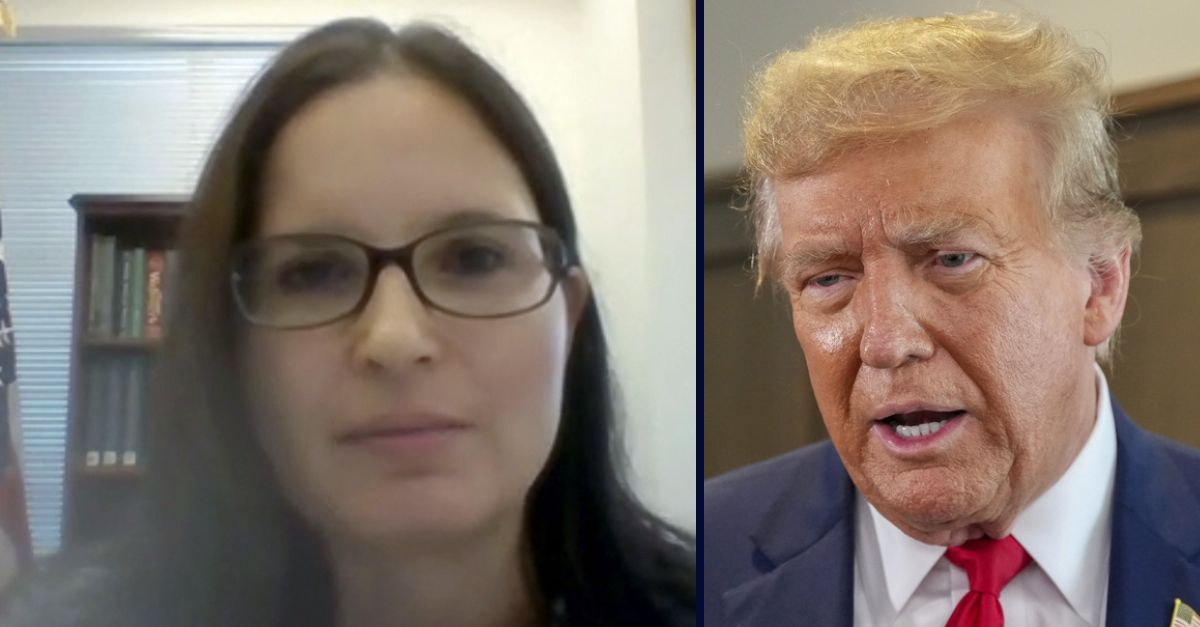

Left: Aileen M. Cannon speaks via remote at a Senate Judiciary Committee hearing (U.S. Senate); Right: Republican presidential candidate former President Donald Trump visits a Chick-fil-A, April 10, 2024, in Atlanta. (AP Photo/Jason Allen)
The judge overseeing former President Donald Trump's Mar-a-Lago classified documents case denied a man's request to file a pretrial brief as a potential friend of the court.
U.S. District Judge Aileen Cannon has been mostly lenient about pretrial briefs, including friend of the court briefs, in this case — only rejecting one other attempt in early March from a man serving a long federal prison sentence for mail and wire fraud.
On Tuesday, the court refused to allow another nonparty filing. The rejected brief was submitted by Darryl B. Phillips, a pro se litigant who describes himself as 'a private citizen and retired Electrical Engineer' with 'experience analyzing complex systems, software and semiconductors' and the author of 'many technical reports.'
'The interest of the person filing this brief stems from observations as a donor in the 1980s to a charity providing aid to brutally oppressed minorities in Soviet Russia,' the brief states. 'Tyrannical repression was carried out through various means including weaponization of the criminal justice system. The person is worried about trends towards similar tyranny in the United States and fears for the future.'
Phillips, who is from a small town in northern California, offers a media critique as an explanation for why he filed a brief in the 45th president's case.
'This amicus brief is written after accepting a challenge to read the indictment, applying engineering critical thinking skills to analysis of the indictment, finding many serious flaws in it, writing a report on those flaws, and noting no competent discussion of those flaws in the press or public,' Phillips states in his filing.
The heart of the rejected brief is an examination of the Presidential Records Act. The author argues Cannon wrongly denied dismissal on that defense — but says both Trump's defense attorneys and special counsel Jack Smith 'failed in their understanding and presentation of the law as it relates to the facts of the case.'
As for the facts themselves, Phillips' understanding of the details at issue more or less aligns with how the defense sees things and will likely argue them in court: Trump had something not entirely unlike plenary power to de-classify and retain the documents in question.
After citing part of the superseding indictment that outlines the government's basic timeline of how the documents disappeared as 'Trump ceased to be President' and 'departed the White House,' the brief says Smith made a basic error that amounts to a 'knowing lie.'
'This core allegation of unauthorized possession is false,' Phillips says. 'It argues a false chronology. President Donald Trump had the boxes moved before 12:00PM on January 20, 2021 while he had Article II Sections 1&2 powers to both authorize possession and waive executive order derived classification regulations regarding the documents.'
Phillips's legal arguments are not likely to be considered, unless they are later used by Trump's defense attorneys. However, the idea that a U.S. president has complete control over presidential papers is also supported in an amicus brief filed in the case by Cannon.
As previously reported by Law&CrimeStephen Miller's group, the America First Legal Foundation (AFL), filed a proposed amicus brief on March 1, claiming expertise in the PRA and NARA. Legal experts criticized Miller's organization's proclaimed expertise on those issues, saying it would be like arguing with someone in 2024 that the world is not flat or debating whether the moon is made of cheese.
However, the judge overseeing the case allowed the former Trump speechwriter to express his views on the issues.
Cannon wrote that the proposed amicus briefs bring relevant matters to the Court's attention and may be helpful in resolving the pretrial motions. early MarchThe amicus briefs are accepted for Court consideration.
Later, Smith criticized the AFL's arguments about the PRA and NARA, calling them unsupported and untenable in reality. Phillips, lacking the political background to have his non-expert opinion considered in the case, had a shorter journey from accomplished EE to potential amicus curiae. His brief requests the Court's patience regarding deadlines, as he only learned about the ability to file an amicus brief pro se as a private citizen on 4/4/2024.
The amicus brief was written after accepting a challenge to read the indictment, applying engineering critical thinking skills to its analysis, and uncovering many serious flaws in it.

